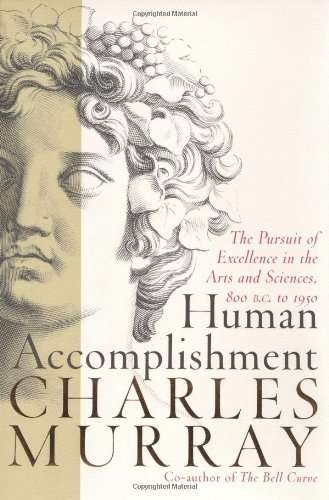
Human Accomplishment: The Pursuit of Excellence in the Arts and Sciences, 800 B.C. to 1950
Check my rate
| Main centres: | 1-3 business days |
| Regional areas: | 3-4 business days |
| Remote areas: | 3-5 business days |

| Main centres: | 1-3 business days |
| Regional areas: | 3-4 business days |
| Remote areas: | 3-5 business days |
Published by Harper,, 2003, first edition, hardcover, illustrated, index, 668 pages, condition: new.
A sweeping cultural survey reminiscent of Barzun's From Dawn to Decadence . "At irregular times and in scattered settings, human beings have achieved great things. Human Accomplishment is about those great things, falling in the domains known as the arts and sciences, and the people who did them.' So begins Charles Murray's unique account of human excellence, from the age of Homer to our own time. Employing techniques that historians have developed over the last century but that have rarely been applied to books written for the general public, Murray compiles inventories of the people who have been essential to the stories of literature, music, art, philosophy, and the sciencesa total of 4,002 men and women from around the world, ranked according to their eminence. The heart of Human Accomplishment is a series of enthralling descriptive on the giants in the arts and what sets them apart from the merely great; on the differences between great achievement in the arts and in the sciences; on the meta-inventions, 14 crucial leaps in human capacity to create great art and science; and on the patterns and trajectories of accomplishment across time and geography. Straightforwardly and undogmatically, Charles Murray takes on some controversial questions. Why has accomplishment been so concentrated in Europe? Among men? Since 1400? He presents evidence that the rate of great accomplishment has been declining in the last century, asks what it means, and offers a rich framework for thinking about the conditions under which the human spirit has expressed itself most gloriously. Eye-opening and humbling, Human Accomplishment is a fascinating work that describes what humans at their best can achieve, provides tools for exploring its wellsprings, and celebrates the continuing common quest of humans everywhere to discover truths, create beauty, and apprehend the good.
When I get to a bookstore one of the first places I head for is the Western Civilization section, which is usually about 1/2 a shelf tucked away in History between Ancient Rome and European countries in alphabetical order. I was surprised to find a book by Charles Murray, whose book Coming Apart I enjoyed. Even better, the book was really cheap and signed by the author. (The person to whom the book was inscribed took a black marker and violently scribbled out their name, further endearing the book to me.) My plan was to flip through it for lulz like one of those Q Magazine "500 Best Songs In The World" issues and then donate it. [Aside: I am old enough to remember when rock and roll writing, while not great by any means, at least wasn't link bait.] Instead of skimming it, I wound up reading the whole thing through, including the appendices. I'm not sure how to rate it other than to give it high markings for effort. I finally decided to go with 4 stars plus a bonus star for being the only history book I've read that contains an explanation of what a p-value is. Apparently there is an entire field called histriometrics, but I've never heard of it. What Mr. Murray does is boil down human accomplishment (humankind's resume, he calls it at one point) into a series of graphs and tables.
From there, Mr. Murray goes stats crazy and starts figuring out what historical factors can contribute to the rise of a da Vinci, Edison, or Euler. He checks things like war (slightly positive correlation), GDP (strongly positive), oppressiveness of government (depends -- if the government is oppressing peasants but not artists, no effect; if the government is oppressing everyone, strongly negative correlation). Some results are very interesting, such as the positive correlation of growing up in an urban area and the positive correlation of having a large number of significant people in the previous generation. He also lays out the significant contributions on a map, which shows that it is a small triangular part of Europe that is responsible for most of the accomplishments listed in the book. America is definitely a late bloomer in this area. (And of course the Sahara Of The Bozarts has nothing to contribute. Go Mencken!) Follow this reasoning, then maybe he should have included St. Francis of Assisi who brought the natural world back into the Church? The last few chapters have to do with decline, because one of the best parts of being old is getting to say how crappy everything is now compared to when people wore onions on their belts as was the fashion back then. But after spending all that time in Excel and MATLAB I'm willing to let him riff for a few chapters. The gist of our decline is two fold: 1. Our culture has taken a nihilistic turn, which robs us of the important inspiration of feeling there is a purpose in one's life and by extension one's work. 2. We have largely abandoned the idea of an absolute good, truth, or beauty.